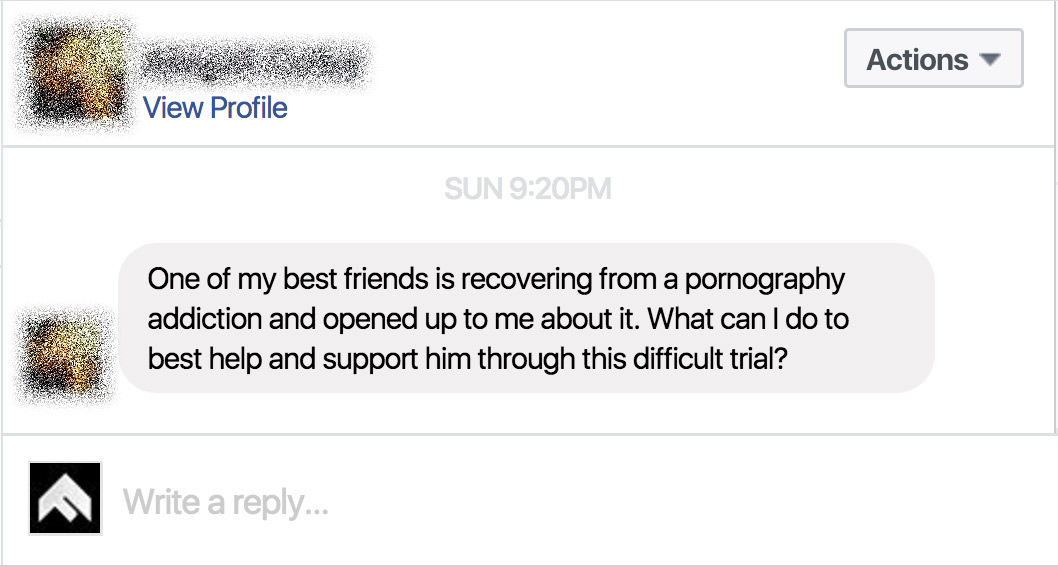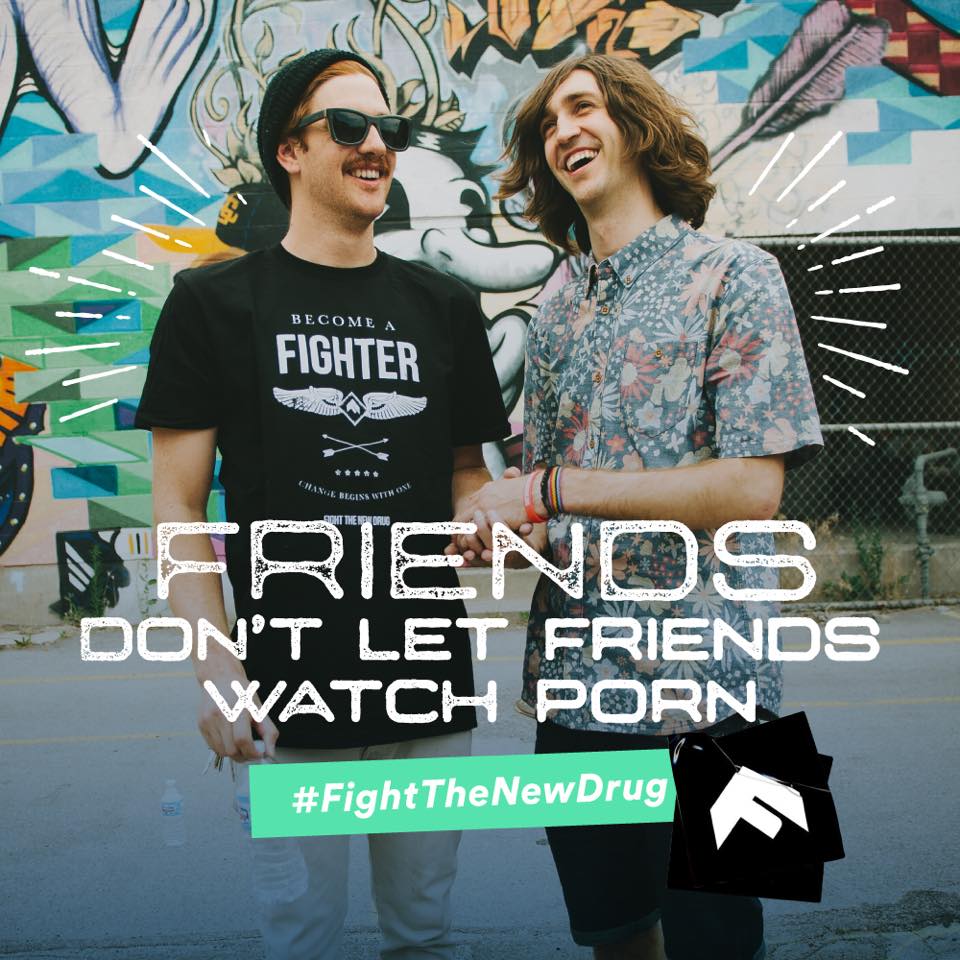By now, many of us have probably been on the receiving end of a message or conversation about a friend, partner, or loved one’s struggle with porn.
Fight the New Drug receives messages like this on the regular:

And if you or a loved one is struggling, you’ve come to the right place.
Before you go anywhere else, we invite you to check out our step-by-step conversation guide that will help you navigate how to talk with someone who shared they’re struggling with porn.
Not everyone is an addict.
The first thing you have to realize is that not every person that consumes porn is an addict or will become an addict. Addiction is a serious disease, and falsely labeling someone as an addict can do some severe damage. There are serious differences between addictions, compulsions, obsessions, and so on.
Imagine what would happen if everyone who had one sip of alcohol was checked into rehab. Addiction is more of a medical problem than a mental one, so misdiagnosis and prescribing the wrong treatment can be dangerous. It’s best to leave it to the professionals.
Addiction or compulsion, no one wants to see their loved ones suffer this way. You want to help lift them out of this quicksand-like problem that’s sucking them in. You want to learn how to heal from the collateral damage that can happen when you love someone with a porn problem—but how?
Here are some basic things you can do to take action and help your loved one and yourself.
Listen.
When someone opens up to you about their struggle with porn, try your best to listen to them without shame or judgment.
If you respond well, they will be more likely to open up to you or others in the future. However, if you respond with shaming or negativity, even if it’s with good intentions, you could make it much more difficult for them to be courageous enough to talk about it in the future, especially when they already feel remorse for themselves.
Think of it this way: if they didn’t already feel bad about their porn struggle, would they be opening up to you? Probably not.
Usually, they don’t need a lecture now, so it’s best to just listen to them talk and share. It can be scary to tell other people about a problem that is frequently stigmatized and usually kept a total secret. Porn is an excruciatingly isolating issue, so make sure they know that they are not alone and you have their back.
It’s normal to feel a strong emotional reaction when someone you love tells you he or she has this problem. It’s not healthy to repress or completely bottle those feelings, but it’s always a good idea to first respond to your loved one with hope, love, and support. There will be time for you to acknowledge and express how you feel, but responding with negativity and anger at the start can damage the start of open conversations that are so needed here. They’ve probably suffered enough by themselves without added shame.
(Read this incredible true Fighter story to see an example of a significant reaction to her opening up about her porn issue.)
Get educated.
In order to be able to help a loved one and understand the issue, it’s time to do your homework.
It’s best to know the science behind how pornography affects the brain, heart, and the world. Understanding the addictive nature of pornography consumption can help you better understand and sympathize with your loved one, too. Check out our blog that has over 1,000 published pieces for more detailed stories about porn’s harms, and the latest research.
For parents, we have a free, step-by-step guide to addressing pornography with your children called Let’s Talk About Porn. We designed it to jumpstart meaningful and shame-free conversations within your own family or community, so we know it’ll be an excellent tool for you and yours!
Recognize that it’s not about you.
It’s common for partners, especially, to feel inadequate when their partners confess an issue with porn. But something that needs to be remembered is that this problem has nothing to do with you. In fact, it usually has little to do with satisfying a need for sex or intimacy.
In super simple terms, pornography consumption is usually an unhealthy coping mechanism that hijacks the pleasure center of the brain. This problem probably existed long before you came into the picture. It’s not your fault, and you’re not to blame.
Family and friends might feel they should be enough for their loved ones. Parents might feel like they should have taken better steps to prevent their loved one from being exposed to pornography at all, but the fact is, it can be found easily almost anywhere you turn.
It can be so easy to take your loved one’s porn consumption personally. But remember that it’s not even about you at all. They have developed their personal issue on their own, and they need to fight on their own. That doesn’t mean you can’t help them out of this dependency by showing them encouragement and support, but realize that if they struggle, it’s not your fault, and you can’t “fix” them.
Find support.
Loving someone who struggles with addictive, obsessive, or compulsive behaviors can take a serious toll. And that goes for any type of unhealthy behavior—drugs, porn, gambling, eating, you name it. The issue might be their problem, but pornography especially can do some damage to relationships and friendships without any intention at all.
Betrayal trauma, depression, anxiety, and distrust can all be side effects of loving and supporting someone with a severe porn problem, especially if it’s a romantic relationship. If you find yourself emotionally affected by your loved one’s struggle, try to find someone you trust that you can talk to.
Consider going to a counselor or therapist because they have been specifically trained to listen to people struggling with these issues, and they aren’t involved in your personal life. There are also support groups for people who have loved ones involved in addictive behaviors. No one walks this path alone.
Porn can kill love in a relationship, but it can also kill self-love, maybe most of all for both the consumer and friend/partner. Make sure that you are taking care of yourself and loving yourself. Think of it as an oxygen mask on an airplane—you have to secure your own support system before you can help someone else. You have to be mentally and emotionally healthy enough to be in a place where you can support them and cheer them on.
Show support.
Because everyone and every situation is different, the best way to help is usually to ask your loved one what you can do to help. What do they need? They can evaluate the situation and determine how you can be involved, whether checking in with them regularly or just listening if they need someone to talk to.
The most important things you can do to support them are to let them know that they are loved and to get your own support system set up. Let them know you are in their corner in this fight—they don’t have to do this alone.
It’s also important to realize that you can’t single-handedly make them better. That’s not your obligation or responsibility, ever. You might have to be their cheerleader on the sidelines rather than getting into the trenches with them, but even cheering them on makes a world of difference. You can give support, but ultimately, they have to do the work and decide to stop for good. And make sure to suggest some excellent recovery programs for them to check out, like our partners at Fortify.
Find the balance.
When it comes to addictive and unhealthy behaviors, there can be a fine line between supporting and enabling. You want to help them in any way you can, but sometimes, helping someone too much can make things worse because they think you support their unhealthy behavior, right? So what’s the answer?
People with porn problems need sympathy, but they also sometimes have to hear that what they are doing is negatively impacting them and their relationships when the opportunity arises. Remember that forgiveness and love are essential to recovery, while shaming is never okay or helpful. At the same time, sheltering someone from the reality of the consequences of their actions is also not helpful either
So, what’s the balance?
Honestly, it depends on the individual case, but there is a pretty good test to measure it: if you put a lot more work into their recovery than they are, you might be enabling rather than helping. And that’s not great for either of you.
Become a Fighter.
Joining the movement allows you to join thousands of other people all over the world that believe in being strong, open-minded, accepting, bold, rebellious, real, understanding, and encouraging by choosing real love over porn.
Be proud to be part of a community that believes in love. You can join our street teams, rep the movement with some awesome Fighter gear from our store, and even invite us to visit your school or community to help spread the word. In the end, we’re all fighting for love together, alongside each other.
And no matter how difficult, the fight is worth it, and there is hope. Both for you, as a friend or partner, and for those who are struggling to break free.





